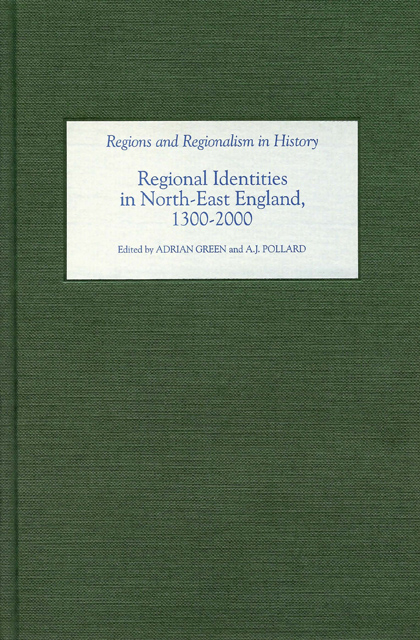Book contents
- Frontmatter
- Contents
- Foreword The AHRC Centre for North-East England History
- Dedication
- Contributors
- Preface
- Abbreviations
- Map
- Introduction Identifying Regions
- 1 North-East England in the Late Middle Ages: Rivers, Boundaries and Identities, 1296-1461
- 2 Borders and Bishopric: Regional Identities in the Pre-Modern North East, 1559-1620
- 3 Law in North-East England: Community, County and Region, 1550-1850
- 4 A Shock for Bishop Pudsey: Social Change and Regional Identity in the Diocese of Durham, 1820-1920
- 5 Business Regionalism: Defining and Owning the Industrial North East, 1850-1914
- 6 Competing Identities: Irish and Welsh Migration and the North East of England, 1851-1980
- 7 Immigrant Politics and North-East Identity, 1907-1973
- 8 Regionalism and Cultural History: The Case of North-Eastern England, 1918-1976
- Conclusion Conclusion Finding North-East England
- Index
4 - A Shock for Bishop Pudsey: Social Change and Regional Identity in the Diocese of Durham, 1820-1920
Published online by Cambridge University Press: 10 March 2023
- Frontmatter
- Contents
- Foreword The AHRC Centre for North-East England History
- Dedication
- Contributors
- Preface
- Abbreviations
- Map
- Introduction Identifying Regions
- 1 North-East England in the Late Middle Ages: Rivers, Boundaries and Identities, 1296-1461
- 2 Borders and Bishopric: Regional Identities in the Pre-Modern North East, 1559-1620
- 3 Law in North-East England: Community, County and Region, 1550-1850
- 4 A Shock for Bishop Pudsey: Social Change and Regional Identity in the Diocese of Durham, 1820-1920
- 5 Business Regionalism: Defining and Owning the Industrial North East, 1850-1914
- 6 Competing Identities: Irish and Welsh Migration and the North East of England, 1851-1980
- 7 Immigrant Politics and North-East Identity, 1907-1973
- 8 Regionalism and Cultural History: The Case of North-Eastern England, 1918-1976
- Conclusion Conclusion Finding North-East England
- Index
Summary
In January 1874 the Newcastle Weekly Chronicle fantasised about resurrecting a long-dead churchman. How would it be, the newspaper wondered, if Hugh Pudsey – the twelfth-century Prince Bishop responsible for the Church's first grants of land and coal rights in 1180 – could be taken to the highest tower of Durham cathedral and invited to look at the social and environmental repercussions of his initial piece of business?
He would open his ghostly eyes with astonishment at the sight of the numerous collieries which now virtually surround the ancient city. On well nigh every hill top, and on the sides of well nigh every valley, are to be seen the lofty chimneys, gigantic engine-houses, and monstrous refuse heaps, which are the signs manual of the great modern monarch King Coal, whose satellites care little or nothing for the picturesque, but sink their shafts and erect their gearing upon the most lovely spot of a lovely landscape if their divining rods indicate the presence beneath of the dark mineral now so precious.
Of course, the Chronicle was not an opponent of coalmining per se: it would have had too acute an awareness of the centrality of the industry to the lives of the vast majority of its readership. But it was a newspaper that was alive to the social cost of coal, and the price of its extraction that was daily being paid in the quality of human life. In a series of articles entitled ‘Our Colliery Villages’, which ran from October 1872 to April 1874, the Chronicle reported on the living and working conditions of the region's mining families and described, more often than not, a scene of social and spiritual crisis. At least part of the crisis was attributable to the shifting rootlessness of the migrant coalfield population, for whom senses of identity and belonging seemed at once threadbare, yet ineffably complex.
- Type
- Chapter
- Information
- Regional Identities in North-East England, 1300-2000 , pp. 93 - 112Publisher: Boydell & BrewerPrint publication year: 2007



